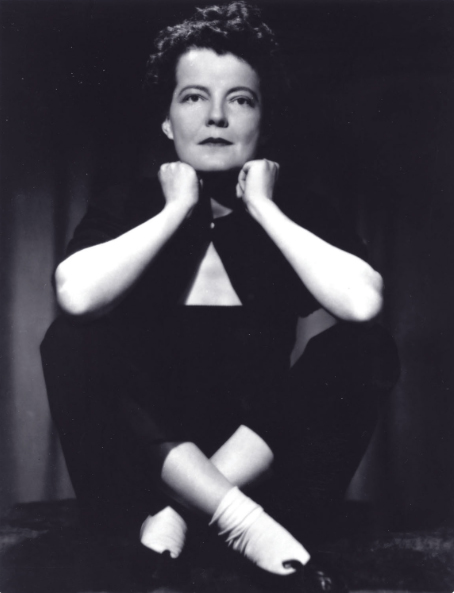
came to represent her subject Margo Jones,
above, because, as Sheehy puts it, Jones
was "always sticking her neck out."
Tennessee Williams dubbed her the "Texas Tornado," and when Margo Jones died, suddenly, on July 24, 1955, he went on a three-week drinking binge. The loss to American theater was monumental: The New York Times Book Review refers to her as "our national theater's patron saint." And, thanks in large part to Helen Sheehy '70, she will not be forgotten.
Sheehy's biography Margo: The Life and Theatre of Margo Jones was first published in 1989, and Southern Methodist University Press reissued it in paperback, with a new introduction by Emily Mann, this past March.
Sheehy also had the opportunity to contribute to director Kay Cattarulla's documentary about Jones, Sweet Tornado, set to air on PBS in March 2006. In addition to interviews with Sheehy, the film features re-enactments by Judith Ivey as Jones and Richard Thomas as Tennessee Williams. Academy-Award-winning actress Marcia Gay Harden narrates.
Sadly, Jones is not a theatrically remembered name, not in the same way some of the playwrights she mentored are, such as Williams, Horton Foote and Kansas' own William Inge. Most people recognize Williams' play The Glass Menagerie. Few know Jones co-directed its first Broadway production. Even fewer know she was responsible for the success of Inherit the Wind, the controversial play based on the Scopes "monkey trial" that was also a response to the McCarthyism of the 1950s.
One motion picture agent advised the playwrights to burn the script. But he didn't forsee the play falling into the hands of Jones, nor did he see the challenge that came from her friend Tad Adoue, who airmailed the script to her: "I double-dog dare you to produce this. Will take GUTS to do in the bible belt." Jones back away from a challenge? Never. On Jan. 10, 1955, the play debuted at Theatre '55 in Dallas, an unlikely city for such fare.
When the play received rave reviews, as Sheehy writes: "Margo asked that the reviews be read over and over again. She then ‘kicked off her shoes and danced and sang in the center of the floor, with tears running down her cheeks.' Despite all the warnings about the Bible Belt's expected response to the play, there wasn't a peep of protest." The play was eventually adapted into a screenplay and has since become a film classic starring Fredric March and Spencer Tracy.

biography "a spring task
of bringing to life again."
Sheehy admits there was a time she didn't know much about Jones. "When I began working on Margo's biography in 1985, I knew little about her, which is shocking since I studied theater and worked in the theater," she says. "Margo's name and pioneering didn't appear in the textbooks — in the official history of the theater, mostly written by men. Biography is a spring task of bringing to life again, and I wanted to make Margo ‘live' again."
No one stood in Sheehy's way. "Margo's brothers and their families welcomed my interest in telling the truth about Margo's life and gave me full access to her files and memorabilia," Sheehy says. "I found many of the people who knew and worked with Margo, including her lover and business manager, Manning Gurian."
Freddie Hoskins, a stage manager at the Hartford Stage Co., was the person Sheehy says "handed to me" Margo Jones "in the summer of 1985." She explains, "When Freddie died, since he had no family, we held his memorial service at the theater. Freddie had worked with Margo in the early years, and we used to sit backstage between shows and he'd tell me ‘Margo' stories.
After the service, I gathered up Freddie's papers and memorabilia. I found many notes, letters and photographs of Margo and a small wooden box. Inside was a polished stone turtle. I learned later that Margo had a vast collection of turtles of all kinds. She gave them as gifts to her friends, and the turtle became a kind of metaphor for Margo — always sticking her neck out, protected by a thick shell that was impervious to criticism, and an unrelenting steady will that eventually wore out — creating the national residential theater."
Sheehy dispels quite a few myths and inaccuracies that have been recorded about Jones, including the circumstances behind her death and her sexuality. Rumors surfaced after she died that she committed suicide or was even murdered. And while it was no secret Jones had a drinking problem, alcoholism was not the direct cause of her death. Jones fell asleep on the carpet of her apartment, an apartment that had recently been cleaned with carbon tetrachloride, a poison. She died 12 days later.
Another rumor that surfaced following Jones' death concerned her sexuality. In her final source note, Sheehy writes: "Perhaps because of her association with homosexuals and the fact that she was a powerful, prominent, unmarried woman who lived alone, there has been gossip that she was a lesbian. In my interviews and research, I pursued this rumor, but after talking with those closest to Margo — her lovers, her friends and coworkers, and her family — I could find no evidence of its truth." What Sheehy did find in the course of her research for the biography, research that took four years, was that Jones had an intense passion for love, life and theater.
Sheehy's own passion regarding the theater has culminated in an extended relationship. She has been involved in one capacity or another for 30 years, and wrote a play, Sparks, last year. "Several theaters are considering it," she reports, "but so far it's had one production in New York."
If she's not involved directly with the theater, she is involved indirectly as a writer and biographer of theater personalities. Her first book was a textbook, All about the Theater, published in 1981. Margo followed in 1989, then Eva Le Gallienne, a woman Amazon.com describes as a "director and muse of top playwrights, a translator of (Henrik) Ibsen, and a founder of the American repertory theater movement." Of Sheehy's biography, Publisher's Weekly wrote, "In this balanced, carefully researched biography of an actress who defied convention, Sheehy has perfectly staged La Gallienne's life." The biography was honored by The New York Times Book Review as one of the most notable books of 1996.
More accolades followed for Sheehy's writing abilities for Eleonora Duse: A Biography, about the Italian stage actress. It was a project that took Sheehy seven years and entailed her learning Italian. The New York Times Book Review again recognized her by naming it a notable book of 2003.
Sheehy continues to write articles and essays and is also "working on a novel titled Willa Hardesty. It's historical and biographical fiction, really, about my mother and father and our family," she explains. "It's like working on a biography because I'm researching their lives and the period, and exploring the world they lived in and were formed by — including the Great Depression, the Dust Bowl, dancing and country music, farming and ranching, boxing and bootlegging."
And at last, with the reissue of Margo and Cattarulla's documentary, it seems Margo Jones herself is making a comeback. "On August 8, Kay and I previewed Sweet Tornado at the Women of Achievement Lecture Series at The Mount, Edith Wharton's house in Lenox, Massachusetts," Sheehy reports. "Margo had something all her own — something all her own, something very rare: the gift to make art happen. Margo changed the culture of her time."





